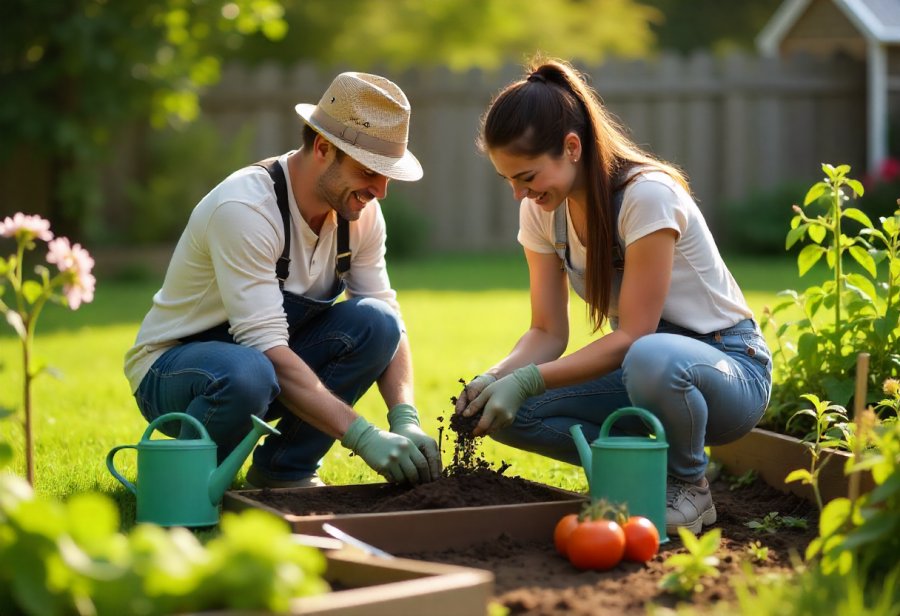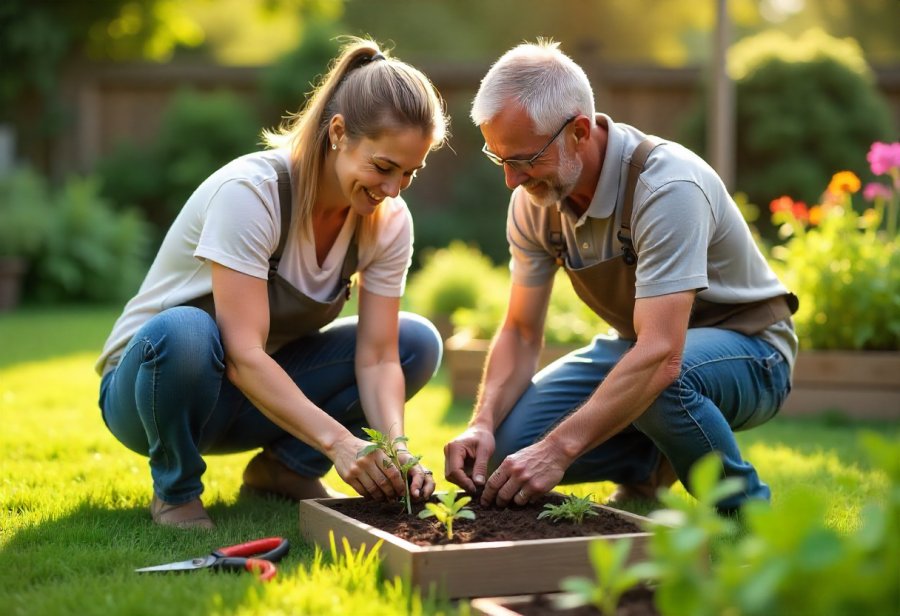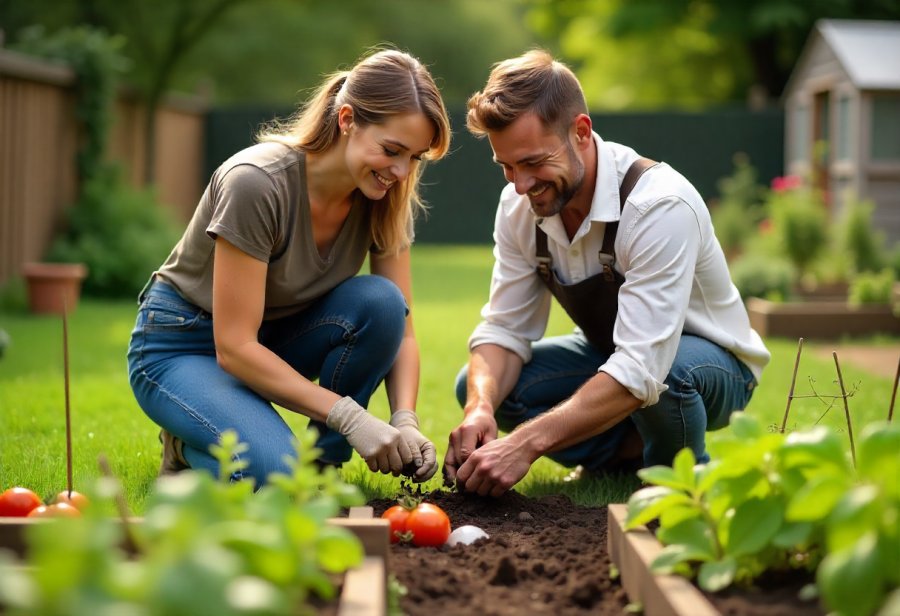In an era dominated by screens and rapid digital interactions, could tending a garden together truly unlock deeper bonds and foster healing? ‘Growing Together’ explores how the simple act of working side-by-side in a backyard or community space goes beyond planting seeds—it cultivates trust, patience, and emotional connection. Historically rooted in cultures worldwide, gardening has long served as a universal language of cooperation and community. Today, innovative approaches like horticultural therapy, urban greening projects, and digital gardening platforms are expanding these timeless benefits. Whether tending balcony herbs or community plots, routines of watering, weeding, and harvesting transform into powerful rituals of shared achievement and mutual care. As research continues to validate nature’s therapeutic impact, the future holds promising new methods—embracing multisensory experiences and technological integration—that make gardening a vital tool for relationship growth and personal resilience. Could the humble garden be the key to reconnecting us in a disconnected world?

Cultivating Connections: How Gardening Deepens Bonds and Fosters Healing
Gardening isn’t just about planting seeds or tending to flowers; it’s a quiet act of connection that can build stronger bonds between people. When we work together in a garden—whether planting, watering, or weeding—we share more than just physical effort. These moments foster teamwork, patience, and mutual attention, laying the groundwork for deeper relationships. As hands work the soil and eyes watch new shoots emerge, a sense of trust and cooperation naturally begins to grow.
Beyond the physical act, gardening offers a calm space for emotional exchange. Tending to plants can be meditative, encouraging mindfulness and emotional openness. When done with others, this shared tranquility creates an environment where conversations flow more easily, and feelings surface more honestly. It’s in these quiet moments—watering a plant or pulling weeds—that genuine connections are often formed.
Gardening also serves as a therapeutic backdrop that supports emotional well-being. Routine activities like watering or pruning can help regulate emotions and reduce stress. Sharing these routines amplifies feelings of calm and connection, making the garden a sanctuary for healing and growth. Over time, caring for a garden together nurtures patience and resilience, qualities that translate into stronger relationships beyond the soil.
In a world dominated by screens and digital interactions, gardening provides a refreshing alternative. Working side-by-side outdoors demands presence and genuine communication, breaking down superficial barriers. Eye contact, shared effort, and mutual care become natural parts of the process—elements that are increasingly rare in everyday life. Through these shared experiences, gardening becomes a powerful way to rebuild authentic bonds in an age of disconnection.
Everyday routines like planting, watering, and harvesting transform simple chores into meaningful rituals. These acts celebrate progress and foster a sense of shared achievement. As plants grow and flourish, so do relationships—strengthened by patience, cooperation, and pride. These routines create lasting memories, turning ordinary tasks into acts of mutual support that deepen emotional bonds.
The act of caring for a garden also mirrors emotional nurturing. Watching a plant bloom or harvest a crop reflects personal growth within the relationship. Patience in tending a garden parallels patience in building trust and understanding. Over time, these shared efforts cultivate not just healthy plants but also emotional closeness that can withstand life’s inevitable challenges.
Gardening’s accessibility makes it a universal language of connection. No special skills or expensive equipment are needed—just the willingness to get your hands dirty and work alongside others. Even small efforts, like planting herbs on a balcony, can foster meaningful interactions. In this way, gardening becomes a gentle, ongoing act of care that nurtures trust, communication, and resilience.
Integrating gardening into daily life creates natural opportunities for healing and connection. Routine acts of tending—whether a small balcony herb garden or a community plot—become powerful rituals of patience, support, and mutual growth. Through these shared acts, relationships are not just maintained but strengthened, proving that sometimes, the simplest acts can have the deepest impact.
From Ancient Roots to Modern Bonds: The History of Gardening and Human Relationships
The link between gardening and human relationships isn’t a modern discovery; it runs deep through history. Ancient civilizations like the Greeks and Romans understood that working together on shared land could strengthen social bonds. They relied on communal gardens and shared plots where neighbors and families collaborated, nurturing trust and a sense of collective responsibility. These early practices showed that tending to the land wasn’t just about food or beauty—it was a way to forge community and deepen connections.
Across cultures worldwide, similar ideas took root. In traditional Asian societies, community gardens served as gathering spots where people planted, cultivated, and harvested together. These shared efforts fostered cooperation, empathy, and belonging. Working side-by-side caring for plants helped turn strangers into friends, laying a foundation of social cohesion built on routine, effort, and mutual care.
Social psychology supports this history, revealing that cooperative activities like gardening naturally promote trust and understanding. When people work toward a common goal, whether planting seeds or watering crops, they develop a sense of teamwork that dissolves barriers. These shared routines and efforts create bonds that can grow into lasting relationships, rooted in mutual effort and emotional investment.
Science backs up what gardeners have long felt: spending time outdoors reduces stress, lifts mood, and boosts emotional well-being. When people tend to plants together, they’re not just nurturing greenery—they’re creating a safe space for emotional expression and trust to develop. This connection between outdoor activity and emotional health has been recognized across cultures and eras, reinforcing gardening’s role as a natural foundation for building relationships.
Looking back, community gardening and outdoor work have often played a role in social movements and urban renewal. During periods of rapid city growth, residents turned to shared gardens as a way to reconnect with each other and with nature. These spaces provided refuge from urban chaos, fostering cooperation and mutual support. Today, neighborhood gardens and urban greening projects continue to serve as vibrant hubs for social bonding, proving their timeless value.
As gardening practices evolve—from traditional communal plots to rooftop gardens and digital communities—the core idea remains unchanged: working in green spaces encourages connection. Modern technology now allows people across distances to share progress, exchange tips, and support each other, expanding the roots of relationship building beyond physical space. These developments highlight how tending to plants continues to be a powerful way to nurture trust and understanding.
Throughout history, tending to plants has been more than a pastime; it’s a universal language of connection. The act of planting, nurturing, and harvesting creates bonds grounded in shared effort, patience, and care. These roots, deeply embedded in our collective experience, remind us that even simple acts like gardening can cultivate lasting relationships. Connecting with nature isn’t just about plants—it’s about planting the seeds for resilience, trust, and community that can flourish through generations.

Growing Together: Innovative Trends in Garden-Based Relationship Building
Today, the ways we use gardening to build relationships and support mental health are more diverse and innovative than ever before. One prominent approach is horticultural therapy, where trained professionals guide participants through structured planting activities designed to promote emotional healing. These sessions go beyond simply growing plants; they aim to help individuals process feelings, boost confidence, and foster trust through hands-on care. Such programs are especially valuable for those facing trauma or mental health challenges, using gardening as a deliberate tool for personal growth.
Community gardening initiatives have gained popularity for their role in strengthening social bonds. Shared spaces like neighborhood gardens or urban plots bring neighbors together to plant vegetables, flowers, or herbs. Participating in these efforts encourages teamwork and open communication, transforming strangers into friends through ongoing collaboration. Over time, these routines and shared efforts create a sense of belonging, rooted in mutual support and collective achievement.
Casual gardening activities, such as tending balcony herbs or small flower beds, have become accessible ways to nurture relationships without demanding much time or resources. These simple routines provide opportunities for connection, whether through tending plants together or sharing stories about growth and progress. Such small acts can spark deeper conversations and emotional closeness, turning everyday moments into meaningful rituals of care and connection.
While gardening offers many benefits, it’s important to recognize that it should complement, not replace, other forms of therapy or personal development. Some critics point out that limited outdoor space or physical limitations might pose barriers for certain individuals. However, innovations like digital gardening apps and urban greening projects are expanding opportunities for everyone to engage in garden-based relationship-building. These tools make nurturing plants more accessible and inclusive, fostering connection regardless of circumstance.
Emerging trends are blending gardening with technology and multisensory experiences. Virtual communities, online tutorials, and interactive platforms enable people to share progress and support each other remotely, broadening the reach of outdoor therapy. Incorporating fragrant herbs, textured plants, and calming sounds into outdoor spaces enhances mindfulness and emotional openness. These innovations make garden-based relationship work more engaging and adaptable, ensuring that the healing power of nature continues to evolve and resonate across diverse communities.
Planting the Seeds of Connection: Practical Ways to Incorporate Gardening into Your Relationships
Getting started with incorporating gardening into your relationships doesn’t have to be complicated. Simple shared activities, like planting a small vegetable or herb garden, create natural opportunities for teamwork and conversation. Choosing easy-to-grow plants that require minimal maintenance keeps the focus on enjoying the process together. Assigning roles—such as one person preparing the soil and the other planting seeds—fosters collaboration from the outset. As you nurture your garden, routine tasks like watering and weeding become moments for connection, encouraging ongoing dialogue and mutual support.
Turning these activities into regular routines transforms gardening into meaningful rituals. Setting a weekly “planting date” or daily watering time adds structure and anticipation, elevating it from a chore to a shared experience. Over time, tending to the same space—whether a balcony pot or backyard bed—strengthens the habit of caring together. Celebrating small milestones, like a first bloom or a fresh harvest, reinforces teamwork and shared pride, deepening emotional bonds and building a sense of collective achievement.
Limited space, busy schedules, or uncertainty about interest can seem like barriers at first. However, container gardening on a balcony or windowsill offers a simple, manageable way to start. Even dedicating a few minutes daily to watering a handful of herbs or succulents can foster connection without demanding much time. Community gardens or neighborhood planting groups provide another accessible option, turning gardening into a collective effort and creating opportunities for ongoing interaction and support.
Sharing stories about your garden’s progress helps deepen your connection. Celebrating milestones, like watching a plant grow or harvesting herbs, creates positive memories rooted in the activity. These moments of shared pride and joy open the door for conversations about hopes, challenges, and personal stories, transforming gardening into a bonding ritual that extends beyond physical care. Personal touches, like dedicating certain plants to special occasions or creating a “gratitude garden,” can make the experience even more meaningful.
The key to integrating gardening into your relationship is consistency and simplicity. Small acts—tending a plant together, sharing stories, establishing routines—can significantly enhance your bond. Gardening becomes an ongoing practice that nurtures patience, communication, and trust. With just a little effort and willingness to get your hands dirty, you turn everyday tending into a powerful way to nurture emotional growth. Planting roots in the soil and in your relationships can lead to lasting strength and resilience, proving that sometimes, the simplest acts have the most profound impact.

Looking Ahead: Emerging Trends and Future Directions in Garden-Focused Relationship Healing
The future of garden-based relationship healing is vibrant and full of potential as innovative approaches continue to emerge. Eco-therapy, which combines ecological awareness with outdoor activities, is gaining momentum. By engaging mindfully with nature, individuals deepen their personal connections while sharing a sense of responsibility for the environment. This dual focus on self and planet cultivates resilience and purpose, making relationships more grounded and meaningful.
Technology is also transforming how we connect through gardening. Virtual communities, online tutorials, and interactive platforms allow people to share progress, exchange tips, and support one another regardless of physical distance. These tools make outdoor therapy more inclusive, especially for urban residents or those with mobility challenges. They reinforce that nurturing plants can be a universal language, fostering bonds beyond geographical borders.
Urban greening projects are reshaping neighborhoods into lively hubs of collaboration. Transforming vacant lots or neglected spaces into community gardens creates opportunities for neighbors to work side-by-side, building trust and camaraderie. As cities become denser, these shared green spaces serve as vital anchors for social interaction, demonstrating how thoughtful design can turn environmental efforts into powerful tools for relationship building.
Multisensory garden experiences are also on the rise. Incorporating fragrant herbs, textured foliage, and calming sounds enhances mindfulness and emotional openness. These immersive environments deepen emotional engagement and make the act of caring for a garden more impactful. For those who benefit from tactile or sensory stimulation, such spaces open new pathways to connection and healing.
Research continues to validate nature’s role in emotional well-being, encouraging practitioners to weave outdoor spaces into broader therapeutic practices. Programs blending gardening with mindfulness, art, and movement recognize that the environment itself nurtures vulnerability and trust. These holistic methods expand the scope of outdoor therapy, making it adaptable to diverse needs and communities.
Cross-disciplinary collaborations are setting the stage for further innovation. Psychologists, environmentalists, urban planners, and technologists are working together to develop inclusive, flexible programs. These efforts aim to broaden access, incorporate emerging technologies, and tailor approaches to different cultural and social contexts, ensuring garden-based relationship work remains relevant and effective.
Staying engaged with these trends involves participating in workshops, supporting community initiatives, and exploring new tools. As awareness grows around nature’s capacity to foster human bonds, opportunities to integrate gardening into everyday life expand. Embracing these innovations ensures that outdoor therapy continues evolving—making relationship healing accessible, dynamic, and rooted in the timeless power of nature.